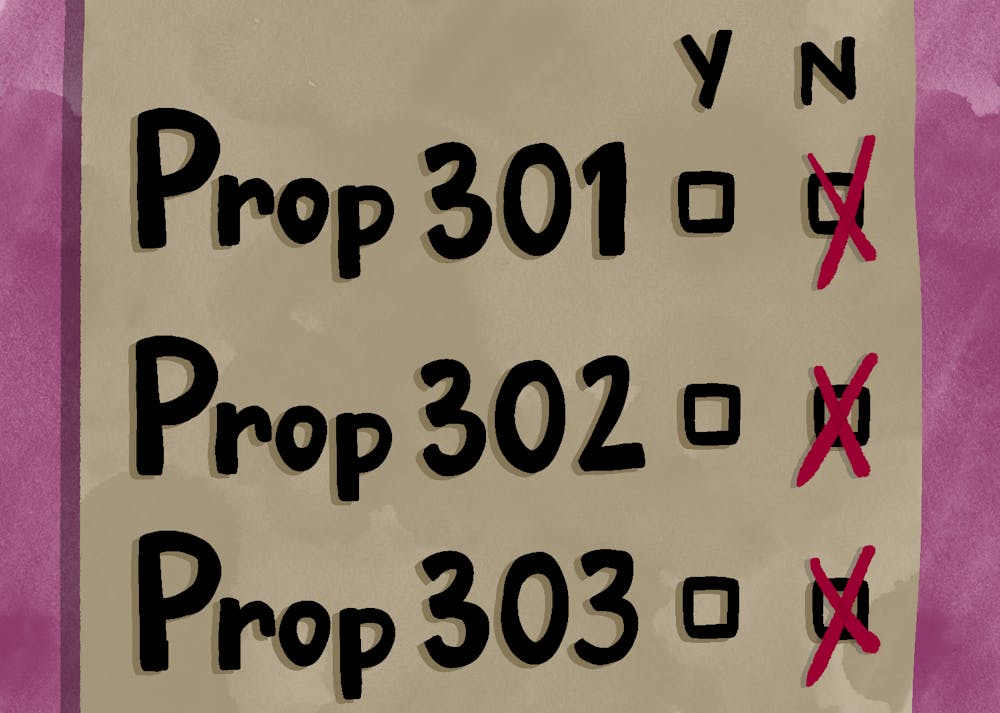Tempe voters should vote no on propositions 301, 302 and 303 to protect their community from further escalation of crises in affordability, sustainability and tax breaks for the wealthy.
The propositions are about land use and a city of Tempe contract with a developer for a proposed Tempe Entertainment District. The district would span more than 46 acres of land and include a 16,000-seat Coyotes arena, businesses, hotels and almost 2,000 apartments.
Ballots for the special election were mailed to residents on April 19 and are expected to be mailed back by May 9. Any mailed ballot that was lost, spoiled, destroyed or not received can be cast in person from May 8 through 16.
READ MORE: Tempe special election for Arizona coyotes arena and entertainment district, explained
The Tempe entertainment district, if approved, would have a devastating effect on the surrounding Tempe community.
There are multiple reasons why voters should vote against the propositions.
Reason one: Gentrification and housing prices
Tammy Nguyen, the outreach director at Arizona Asian American Native Hawaiian and Pacific Islander for Equity, said she thinks the entertainment district would lead to higher housing prices and that stadiums, like the one proposed for the Coyotes, have a history of gentrifying communities.
"Having this development, we feel, will make things significantly worse. It’ll cost us even more money to mitigate these issues," Nguyen said. "It also will, quite frankly, put more blood on the city’s hands, because come summertime, people die every single day."
The developer would also make a pathetic contribution to the City’s affordable housing fund.
"This Coyote development, even though it’s a $2.1 billion development ... they are contributing a measly $2 million to the affordable housing fund," said Dawn Penich-Thacker, a faculty associate at ASU and organizer with Tempe 1st, a PAC and grassroots organization against the propositions.
The contribution is too small, but the problem is less about making adequate contributions to the fund and more about the developments in the first place.
Reason two: Sustainability
At a time when the city of Tempe should be looking to conserve water instead of wasting it on a billionaire pet project (more on that later), the entertainment district would take from resources the community desperately needs.
Lauren Kuby, a Tempe 1st leader, former Tempe City Council member and senior Global Futures Scientist at ASU, said she has "deep concerns" with the proposed entertainment district.
"The City did not conduct an environmental assessment (of the development)," Kuby said. "They will say, 'well, we don’t typically conduct environmental assessments for developments.'"
There are other environmental impacts too, including a proposal to move a dam and increased traffic. According to the NHL, it takes "12,000-15,000 gallons of water to make an ice sheet," which will add to the environmental impact of hockey arenas. Meanwhile, Southwestern states including Arizona are amid a 100-year drought as the Colorado River faces a shortage.
Ice rinks also use refrigerants that can damage the environment through greenhouse gases.
Reason three: Tax policy
The financial burden of the deal is shifted away from its billionaire proponent, Alex Meruelo, to the people of Tempe, who are already harmed by the proposal, through a Government Property Lease Excise Tax.
The basics of it is that the arena, music venue and Coyotes' facilities will not have to pay property taxes for 30 years, and the other facilities including residences, offices and hotels won’t need to pay property taxes to the city for eight years.
While the properties don’t have to pay taxes, the developers pay an excise tax on products or services sold at the site of the development. Yes — that means that people who go to visit these sites will pay an extra tax on purchases made there. Meanwhile, the property owners will get a massive tax break.
Dave Wells, a teaching professor at ASU and research director of the Grand Canyon Institute, said that the development will be a "net drain, not a net gain" for Tempe.
On top of that, the development is located in a certified opportunity zone that encourages private capital investments through deferments of capital gain taxes.
It’s all one big tax break and giveaway to the wealthy owner of the development company, Alex Meruelo.
Reason four: Alex Meruelo
Meruelo owns both the Arizona Coyotes and Bluebird Development LLC. Yes, Bluebird Development LLC would be the organization that would buy the land, which is not-so-coincidentally owned by Meruelo, who also owns the Coyotes.
Meruelo has a history of harming local communities.
While in Glendale, the Coyotes (still owned by Meruelo) had to pay $1.3 million in back taxes to Glendale after the city forced the team to either pay or be locked out of Gila River Arena, now named Desert Diamond Arena.
This isn’t a history that voters should bring to the city of Tempe.
Reason five: Lack of public input
In what’s becoming an alarming trend in Tempe, the development agreement was reached by the city, according to some organizers, with little awareness raised and little community input sought.
"The negotiated deal was first presented to residents the Tuesday before Thanksgiving and then voted on a week later. I never saw that happen in all my time on council," Kuby said.
The city of Tempe, in another show of disregard for public input, approved of the South Pier development but opposed of it being put on the ballot.
READ MORE: Controversial Tempe Town Lake housing development lands on spring ballot
If voters approve the entertainment district, one would wonder what more publicity would have done to people’s voting intentions.
"I think at face value, this sounds really exciting, right? I would be excited if I heard that there’s an entertainment district coming that’ll bring in a professional sports team and businesses," said Isabel Hiserodt, a sophomore studying political science and the president of ASU Young Democrats.
"I would just encourage any student voters to look into it a little more because I think it seems great at face value, but there’s a lot more behind that," Hiserodt said.
So, it’s crucial to ask: why is it that the city entered a contract with a much-maligned billionaire with little community input sought?
Why is it that the city wouldn’t run an environmental assessment of a gigantic development in the middle of a global climate crisis that is deeply affecting the Southwest?
There are many possible answers, but one thing is obvious. The city is not prioritizing the majority of its residents, who are renters, students and working-class people.
It would rather prioritize a glitzy, glamorous entertainment development that is environmentally destructive and fiscally irresponsible because it’s easier to go with what those with money want than to do the opposite.
Yet, Tempe voters have the final say. They should cast their ballots in opposition to propositions 301, 302 and 303, and demand that the city works to make life easier for its residents.
Edited by Kate Duffy, Jasmine Kabiri and Grace Copperthite.
Reach the columnist at astigile@asu.edu and follow @StigileAaron on Twitter.
Editor's note: The opinions presented in this column are the author's and do not imply any endorsement from The State Press or its editors.
Want to join the conversation? Send an email to opiniondesk.statepress@gmail.com. Keep letters under 500 words and be sure to include your university affiliation. Anonymity will not be granted.
Like The State Press on Facebook and follow @statepress on Twitter.

Aaron Stigile is an opinion columnist at The State Press. He previously wrote for The Defiant Movement and is working toward a bachelor’s degree in Journalism and Mass Communication. He is also working toward a minor in Spanish and a certificate in Cross-Sector Leadership.




